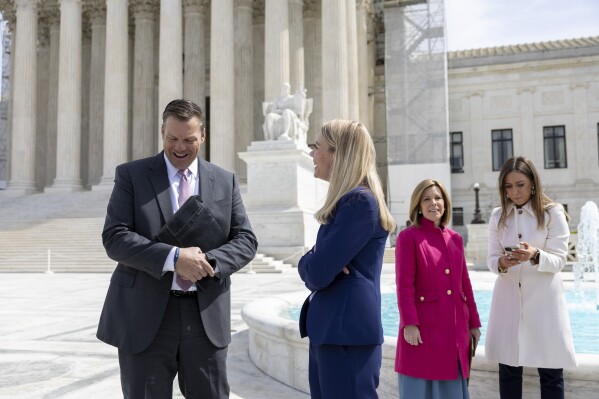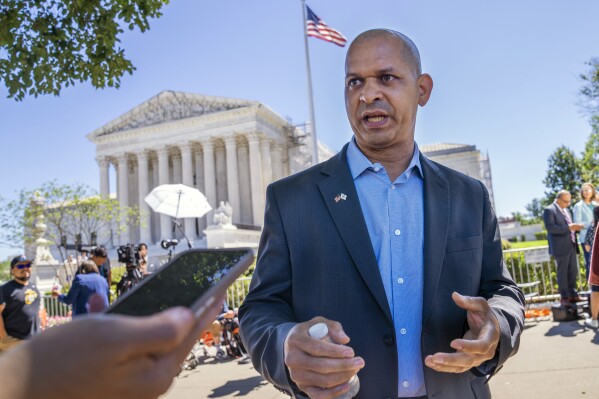Support truly
independent journalism
Support Now
Our mission is to deliver unbiased, fact-based reporting that holds power to account and exposes the truth.
Whether $5 or $50, every contribution counts.
Support us to deliver journalism without an agenda.

Louise Thomas
Editor
The UK has a new political leader and a new ruling party after Sir Keir Starmer’s Labour Party won a historic landslide victory in the nation’s general election on Thursday.
Winning 412 seats to just 122 for Conservatives, Rishi Sunak’s party spectacularly crashed out of power after 14 years.
Britain’s short-lived former prime minister Liz Truss (who put in an appearance at CPAC in February) lost her seat, as did a host of other prominent Tories.
Meanmwhile, MAGA ally Nigel Farage finally won a seat for his right-wing Reform UK party, in what marked his eighth attempt at joining the House of Commons.
Donald Trump, the Republican presidential candidate, has already rushed to Truth Social to congratulate his old ally while remaining silent on Starmer’s triumph.
President Joe Biden is expected to join other world leaders in putting in a call to Starmer as he enters 10 Downing Street later on Friday, with whoever wins November’s presidential election expected to forge a bond to ensure the fabled “special relationship” between the United States and Britain remains in rude health.
But how has America’s news media reacted to these seismic political developments across the Atlantic? And what do they make of the UK’s new leader?

Major outlets quickly lead their homepages on the landslide election victory over the other side of the pond. The New York Times headlined its coverage with a plainly matter-of-fact banner, “Labour Party Wins UK Election in a Landslide”, The Washington Post offered a little more color by explaining, “Labour moves to take reins of power; Starmer to meet king”, while CNN opted for the more bold and dramatic: “The UK has a new leader.”
Fox News labelled the result a “power shift” on its website, calling the outcome a “big win for left-leaning party”.
Even The New York Post was relatively sober, reporting: “UK’s next prime minister Keir Starmer promises ‘age of national renewal’ as Labour Party celebrates landslide victory.”
But they had more colorful descriptions for the man at the helm.
“Lefty lawyer”, the inspiration behind Mark Darcy in Bridget Jones’ Diary and a man who is somewhat lacking in “star power” were just some of the phrases used to describe Starmer almost as soon as the race was called.
With Farage, Truss and Boris Johnson the only Westminster names well-known among many US citizens, The Washington Post offered an in-depth introductory profile of Sir Keir and his “intriguing real-life story”.
The newspaper declared that Starmer “brings working-class roots, a forensic legal style and a ruthless approach to politics” and characterised him as a man of contradictions whose potential to be as “transformative” as former PM Tony Blair is real but threatens to be “undone by the deep divisions in his own party”.
The Post noted that he edited a “Trotsky magazine” in his youth and was once an avowed anti-monarchist but has since been knighted in reward for his work as director of public prosecutions, in which role “the lefty lawyer defended vegan anarchists before prosecuting terrorists on behalf of the British crown”.
The paper was not entirely sold on his lack of “flash”, saying he is “no Winston Churchill” as a public speaker, and observed: “People have been able to project onto him what they want to believe.
“For a long time, he even benefited from the rumor that he was the inspiration for the Mark Darcy/Colin Firth urbane-human-rights-lawyer character in the Bridget Jones books and movies.”
The Post added helpfully: “He was not.”
The NYT also mused that Starmer’s star power is in short supply. The “61-year-old former human rights lawyer lacks the star power of some of his predecessors”, the paper wrote, but seemed consoled by an analyst suggesting he at least looks “relatively prime-ministerial”.
CBS News also attempted to address the question: “Who is Keir Starmer?”
The network noted that the new PM has “faced years of criticism for a perceived lack of charisma, but his methodical mission to drag Labour back toward the centre of British politics and broaden its appeal to voters, appears to have worked”.
America remains much more enthralled by Farage’s creaky pizzazz, with The NYT hailing him as “Britain’s best known political disruptor”and as a “polarising, pugilistic figure and a highly-skilled communicator” who has “poached” the Conservatives’ voters and stands poised to pick the bones of “the party’s remnants”.
Meanwhile, on social media, US commentators up very late or very early delighted in sharing excruciating clips of Truss making a fool of herself at CPAC in February or helpful maps to put the result in context for an American audience.
Some marvelled at the civilised transfer of power after Sunak called Starmer to congratulate him on his victory in the early hours of the morning when the result proved beyond doubt.
MSNBC’s Joe Scarborough took a similar line on Friday’s Morning Joe, commenting on Sunak’s gracious concession in a dig at Trump: “That’s called a peaceful transfer of power.
“Actually that’s what we had in the US from the late 1700s until the year 2020 when Donald Trump refused to do it.
“It’s better that way because you actually let the voters decide.”
But back online, commentator Bradley P Moss insisted it was still not too late for the outgoing PM, joking: “Sunak can still win if Mike Pence has courage and exposes the massive Dominion fraud.”
Disclaimer: The copyright of this article belongs to the original author. Reposting this article is solely for the purpose of information dissemination and does not constitute any investment advice. If there is any infringement, please contact us immediately. We will make corrections or deletions as necessary. Thank you.



